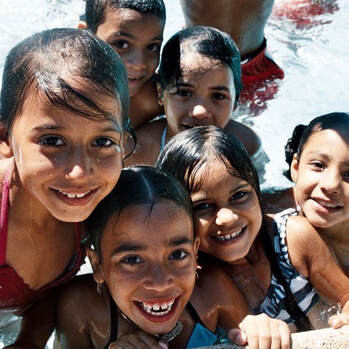Let the Children Teach Us
 Photo: www.campcourant.org
Photo: www.campcourant.org
Stories are wonderful teaching tools. Here is one about Ubuntu (oo-boon-to).
Source: www.harisingh.com/UbuntuAge.htm.
Once upon a time, an anthropologist studying the habits and customs of an African tribe found himself surrounded by children most days. So he decided to play a little game with them. He managed to get candy from the nearest town and put it all in a decorated basket at the foot of a tree.
Then he called the children and suggested they play the game. When the anthropologist said "now", the children had to run to the tree and the first one to get there could have all the candy to him/herself.
So the children lined up waiting for the signal. When the anthropologist said "now", the children took each other by the hand and ran together towards the tree. They all arrived at the same time, divided up the candy, sat down and began to happily munch away.
The anthropologist went over and asked why they had all run together when any one of them could have had the candy all to themselves.
The children responded: "Ubuntu. How could any one of us be happy if all the others were sad?"
Ubuntu is a philosophy of African tribes that can be summed up as "I am what I am because of who we all are."
This story, whether true or not demonstrates that children have much to teach us if we let them. That’s because children have rich spiritual lives; grapple with a variety of religious/spiritual issues; waken to spirituality in different ways at different ages and can articulate their views in often charming
ways. We can also learn a great deal by revisiting our earliest spiritual/religious experiences and relating them to what we believe and ‘know’ in the present.
I remember my first awareness of this. I was 8 years old. It was a sunny afternoon. My friend and I were sitting on a low cement wall outside her house after school. She turned to me and said, “I feel sorry for you Beth cause’ you’re going to hell.” Of course my surprised response was, “Why?” “Because,” she said, you’re not Catholic.”
I don’t remember what I said to her in response but I do remember walking home and thinking that ‘God (as I understood the concept at the time) would never send anyone to hell for not being Catholic. I don’t remember anyone telling me that but I knew it was true just as surely as I knew my name was Beth – absolutely no doubt. I did not need anyone to validate that knowledge or confirm it. It was certain. It was in my cells. That was the beginning of my spiritual awakening.
The topic of children’s spirituality has been researched, discussed and documented by many social scientists such as the Gesell Institute of Child Development, authors Robert Cole, Marsha Sinetar and Swami Satyananda Saraswati. According to these sources, children between the ages of five and seven begin to ask specific questions such as:
They are also aware that a good self and a bad self can exist side by side in themselves. Here’s an example from a poem written by a young ‘waking’ child.
My Good Self
When my bad self starts talking
My good self starts walking
Cause’ my bad self gets me into trouble
Trouble that is double
So when my good self comes to stay
My bad self goes away
By age 8, belief in higher realities begin to surface and children ask the BIG questions:
Ten is the age when most believe in a God but a large number say they don’t. The Divine is perceived of as a ‘spirit’ by most and as a ‘man’ by some. Some children hold the belief that “God makes things happen to you.’
A majority of ‘awakened’ 11 year olds think of the divine as a spirit or imaginary person. They are beginning to sort out what they’ve been taught and what they really think. They begin to scrutinize creation stories. I remember this stage in my own life. I settled firmly on the conclusion that if the story about Adam and Eve were true, then we all had to be related and we were all part of a global family. Therefore differences, arguments, disagreements and fights were just ‘family’ drama that often reflected what went on around my family’s dinner table – “so within, so without.”
From ages thirteen through sixteen, the progression of religious/spiritual thought is said to progress like this:
I dealt with many of these same issues in my teens but hit the jackpot one day when the minister of my church addressed our youth group and said in so many words (which I have NEVER forgotten) – God is within each of you as a characteristic or a talent. It is your responsibility, your job, and your life’s work to discover what that is and share it with the world.
This watershed moment was a true spiritual opening that keeps growing even now. I no longer hold the traditional view of a God as an all seeing, all-powerful entity but 4 upon reflection I see clearly how my current spirituality, based on the philosophy of yoga was built on the foundation of my childhood beliefs and experiences.
Do others have similar experiences but with different results? Absolutely! Over a long lunch and discussion on the topic, a friend of mine, shared that her first awareness of the divine that she received directly from her family was that God was love. That, she said was a pleasant feeling but was soon followed by fear and shame because if God could ‘see’ everything, then God could see her ‘bad’ thoughts and behaviors. This was reinforced by her grandmother’s edict that God would send a lightening bolt from heaven to ‘strike you down’ if you misbehaved.
After observing the often-hypocritical behavior of adults in her family’s church she found herself wondering, “How did the devil get into church and do so well with the adults and why wasn’t God’s lightening bolt striking them down.”
Today she has come full circle back to her original view that ‘God is love.’ She says that this view has been confirmed and reinforced by what she learned from working with the hundreds of elementary school children who entered her life through her long career in education. That, view, she says is summed up in the phrase, “There is ‘something’ that loves us.”
What we can learn about spirituality from children comes from the magic of our own memories and experiences and from the children who come into our lives - - - “for a reason, a season or a lifetime,” (Iyanla Vanzant)
What a marvelous adventure we undertake when ask ourselves spiritually ‘juicy’ questions such as:
And what a marvelous opportunity we have to learn when children ask us questions like, “Where do we go when we die,” and “Can we call God on the telephone?” We have several ways to respond. If they are children in our care, we may appropriately suggest that they ask that question of their parents, minister, priest, imam or rabbi. If they are our children we may answer with the intention to transmit our own values and beliefs.
But what would happen if we replied with something like, “That is a wonderful question – what do you think the answer might be?”
Then we can open our ears, our minds and our hearts; listen for their answers and let the children teach us.
Beth Gibbs, MA, E‐RYT 500, is a certified yoga therapist through Integrative Yoga Therapy. She is a senior member of the IYT teaching faculty and directs the school’s Professional Yoga Therapist Internship Program. Beth has a master’s degree in Yoga Therapy and Mind/Body Health from Lesley University in Cambridge, MA. She teaches therapeutic yoga for all levels and to those working with a wide variety of health conditions. She has a special love of introducing yoga to children and is the author of, "Ogi Bogi, The Elephant Yogi," a therapeutic yoga book for children with a companion manual for adults who work with children. The expected release date is spring 2014. Beth lives and teaches in Connecticut.
© 2013
Source: www.harisingh.com/UbuntuAge.htm.
Once upon a time, an anthropologist studying the habits and customs of an African tribe found himself surrounded by children most days. So he decided to play a little game with them. He managed to get candy from the nearest town and put it all in a decorated basket at the foot of a tree.
Then he called the children and suggested they play the game. When the anthropologist said "now", the children had to run to the tree and the first one to get there could have all the candy to him/herself.
So the children lined up waiting for the signal. When the anthropologist said "now", the children took each other by the hand and ran together towards the tree. They all arrived at the same time, divided up the candy, sat down and began to happily munch away.
The anthropologist went over and asked why they had all run together when any one of them could have had the candy all to themselves.
The children responded: "Ubuntu. How could any one of us be happy if all the others were sad?"
Ubuntu is a philosophy of African tribes that can be summed up as "I am what I am because of who we all are."
This story, whether true or not demonstrates that children have much to teach us if we let them. That’s because children have rich spiritual lives; grapple with a variety of religious/spiritual issues; waken to spirituality in different ways at different ages and can articulate their views in often charming
ways. We can also learn a great deal by revisiting our earliest spiritual/religious experiences and relating them to what we believe and ‘know’ in the present.
I remember my first awareness of this. I was 8 years old. It was a sunny afternoon. My friend and I were sitting on a low cement wall outside her house after school. She turned to me and said, “I feel sorry for you Beth cause’ you’re going to hell.” Of course my surprised response was, “Why?” “Because,” she said, you’re not Catholic.”
I don’t remember what I said to her in response but I do remember walking home and thinking that ‘God (as I understood the concept at the time) would never send anyone to hell for not being Catholic. I don’t remember anyone telling me that but I knew it was true just as surely as I knew my name was Beth – absolutely no doubt. I did not need anyone to validate that knowledge or confirm it. It was certain. It was in my cells. That was the beginning of my spiritual awakening.
The topic of children’s spirituality has been researched, discussed and documented by many social scientists such as the Gesell Institute of Child Development, authors Robert Cole, Marsha Sinetar and Swami Satyananda Saraswati. According to these sources, children between the ages of five and seven begin to ask specific questions such as:
- What does God look like?
- Is God a man?
- What does God do?
- Can we call God on the telephone?
They are also aware that a good self and a bad self can exist side by side in themselves. Here’s an example from a poem written by a young ‘waking’ child.
My Good Self
When my bad self starts talking
My good self starts walking
Cause’ my bad self gets me into trouble
Trouble that is double
So when my good self comes to stay
My bad self goes away
By age 8, belief in higher realities begin to surface and children ask the BIG questions:
- Where did we come from?
- Why are we here?
- Where do we go when we die?
Ten is the age when most believe in a God but a large number say they don’t. The Divine is perceived of as a ‘spirit’ by most and as a ‘man’ by some. Some children hold the belief that “God makes things happen to you.’
A majority of ‘awakened’ 11 year olds think of the divine as a spirit or imaginary person. They are beginning to sort out what they’ve been taught and what they really think. They begin to scrutinize creation stories. I remember this stage in my own life. I settled firmly on the conclusion that if the story about Adam and Eve were true, then we all had to be related and we were all part of a global family. Therefore differences, arguments, disagreements and fights were just ‘family’ drama that often reflected what went on around my family’s dinner table – “so within, so without.”
From ages thirteen through sixteen, the progression of religious/spiritual thought is said to progress like this:
- Age 13: Children start to doubt belief in God, but are shocked by their own doubt and have not yet evolved their own belief system.
- Age 14: They see the divine as an unexplainable mystery.
- Age 15: Many are unsure of ideas about the divine but know there has to be something because otherwise how would life have gotten started
- Age 16: Many state that God is not a man or a human form but a guiding ruler, a power or just a feeling. Many ‘feel’ this as reality even if it can’t be proven.
I dealt with many of these same issues in my teens but hit the jackpot one day when the minister of my church addressed our youth group and said in so many words (which I have NEVER forgotten) – God is within each of you as a characteristic or a talent. It is your responsibility, your job, and your life’s work to discover what that is and share it with the world.
This watershed moment was a true spiritual opening that keeps growing even now. I no longer hold the traditional view of a God as an all seeing, all-powerful entity but 4 upon reflection I see clearly how my current spirituality, based on the philosophy of yoga was built on the foundation of my childhood beliefs and experiences.
Do others have similar experiences but with different results? Absolutely! Over a long lunch and discussion on the topic, a friend of mine, shared that her first awareness of the divine that she received directly from her family was that God was love. That, she said was a pleasant feeling but was soon followed by fear and shame because if God could ‘see’ everything, then God could see her ‘bad’ thoughts and behaviors. This was reinforced by her grandmother’s edict that God would send a lightening bolt from heaven to ‘strike you down’ if you misbehaved.
After observing the often-hypocritical behavior of adults in her family’s church she found herself wondering, “How did the devil get into church and do so well with the adults and why wasn’t God’s lightening bolt striking them down.”
Today she has come full circle back to her original view that ‘God is love.’ She says that this view has been confirmed and reinforced by what she learned from working with the hundreds of elementary school children who entered her life through her long career in education. That, view, she says is summed up in the phrase, “There is ‘something’ that loves us.”
What we can learn about spirituality from children comes from the magic of our own memories and experiences and from the children who come into our lives - - - “for a reason, a season or a lifetime,” (Iyanla Vanzant)
What a marvelous adventure we undertake when ask ourselves spiritually ‘juicy’ questions such as:
- What did I believe as a child?
- Where did those beliefs come from?
- Have they changed over time?
- At what age did they change?
- Do I still hold those values and beliefs?
- If so, why?
- If not, why not?
And what a marvelous opportunity we have to learn when children ask us questions like, “Where do we go when we die,” and “Can we call God on the telephone?” We have several ways to respond. If they are children in our care, we may appropriately suggest that they ask that question of their parents, minister, priest, imam or rabbi. If they are our children we may answer with the intention to transmit our own values and beliefs.
But what would happen if we replied with something like, “That is a wonderful question – what do you think the answer might be?”
Then we can open our ears, our minds and our hearts; listen for their answers and let the children teach us.
Beth Gibbs, MA, E‐RYT 500, is a certified yoga therapist through Integrative Yoga Therapy. She is a senior member of the IYT teaching faculty and directs the school’s Professional Yoga Therapist Internship Program. Beth has a master’s degree in Yoga Therapy and Mind/Body Health from Lesley University in Cambridge, MA. She teaches therapeutic yoga for all levels and to those working with a wide variety of health conditions. She has a special love of introducing yoga to children and is the author of, "Ogi Bogi, The Elephant Yogi," a therapeutic yoga book for children with a companion manual for adults who work with children. The expected release date is spring 2014. Beth lives and teaches in Connecticut.
© 2013

